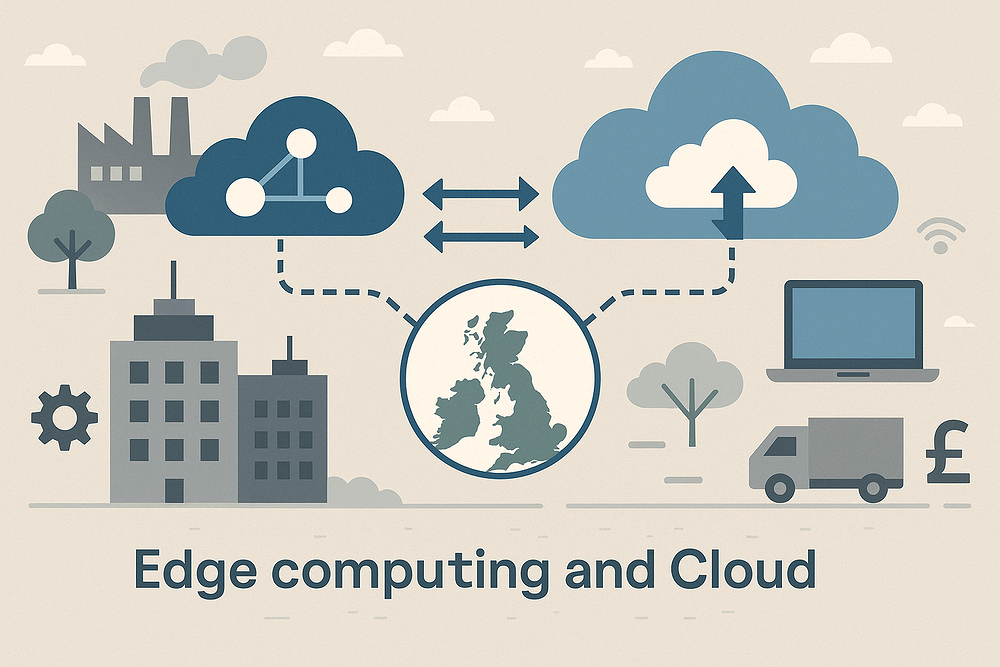Leveraging AI-Powered Cloud Tools: A 2025 Guide for UK SMEs

Leveraging AI-Powered Cloud Tools: A 2025 Guide for UK SMEs
In today's rapidly evolving digital landscape, UK small and medium enterprises (SMEs) face both unprecedented challenges and opportunities. As we move through 2025, the integration of artificial intelligence with cloud computing has transformed how businesses operate, compete, and grow. At AppCoder, we've observed how these technologies are no longer optional extras but essential components of business success.
This guide explores how UK SMEs can strategically leverage AI-powered cloud tools to enhance productivity, reduce costs, and drive innovation in the current business environment.
The State of AI-Powered Cloud Computing in 2025
The cloud computing landscape has evolved dramatically since the early 2020s. With the UK government's Digital Strategy 2025 now in full swing, more British businesses than ever are embracing cloud technologies. Recent data from TechUK shows that as of April 2025, 87% of UK SMEs utilise some form of cloud service, a significant increase from 72% in 2023.
The most transformative development has been the deep integration of AI capabilities into cloud platforms. What began as separate technologies have now converged into unified solutions that offer unprecedented capabilities for businesses of all sizes.
Key AI-Cloud Trends Shaping UK Business in 2025
- Democratised AI access - Enterprise-grade AI tools are now accessible to SMEs through subscription models
- Industry-specific AI solutions - Vertical-focused cloud tools designed for sectors like retail, healthcare, and financial services
- Edge-cloud hybrid computing - Processing sensitive data locally while leveraging cloud AI capabilities
- Sustainability-focused cloud solutions - Meeting the growing regulatory and consumer demand for environmentally responsible operations
Essential AI-Powered Cloud Tools for UK SMEs
The following categories of tools represent the most valuable AI-cloud integrations for SMEs looking to gain competitive advantage in today's market:
1. Intelligent Business Process Automation
Business process automation has evolved beyond simple rule-based systems to incorporate sophisticated AI capabilities that can handle complex workflows with minimal human intervention.
UK businesses are increasingly adopting tools like Microsoft Power Automate Cloud and the newly launched UKAutomate platform, which combines AI-driven process mining with automated workflow creation. These systems can identify inefficiencies in your operations and suggest optimised processes based on your specific business patterns.
For example, a London-based retail client of ours implemented an AI-powered inventory management system that reduced stockouts by 32% while decreasing inventory carrying costs by 18% in just four months.
2. AI-Enhanced Data Analytics and Business Intelligence
The latest generation of cloud-based analytics platforms goes beyond visualising data to actively interpreting it and suggesting actions. Solutions like Google's BigQuery ML and Amazon QuickSight Q now feature natural language interfaces that allow non-technical staff to ask complex questions of company data.
These tools can identify patterns and anomalies that would be impossible for humans to detect, particularly valuable for SMEs without dedicated data science teams. The recent integration of large language models (LLMs) with these platforms means you can now receive comprehensive narrative reports explaining what your data means and recommending specific business actions.
3. Intelligent Customer Experience Platforms
Customer experience has become the primary competitive differentiator for many businesses. AI-powered cloud tools in this space have made sophisticated customer engagement accessible to SMEs with limited resources.
The most impactful developments include:
- Omnichannel AI assistants - Systems that maintain context across multiple communication channels
- Sentiment analysis engines - Tools that detect customer emotions and adapt responses accordingly
- Predictive customer service - Solutions that identify potential issues before customers report them
UK-specific platforms like ServeAI have emerged with compliance features tailored to UK and EU regulations, including the updated Data Protection and Digital Information Act that came into effect in January 2025.
4. AI-Driven Cybersecurity Solutions
With cyber threats becoming increasingly sophisticated, traditional security approaches are no longer sufficient. Cloud-based security platforms now leverage AI to provide adaptive protection that evolves as threats do.
The National Cyber Security Centre's Spring 2025 report highlighted that SMEs using AI-powered security tools experienced 64% fewer successful breaches compared to those using conventional security measures.
Key capabilities include anomaly detection, automated threat response, and continuous vulnerability assessment—all managed through cloud platforms that require minimal in-house expertise.
Implementation Strategies for UK SMEs
Successfully implementing AI-powered cloud tools requires a strategic approach tailored to your business needs and resources.
Conducting a Digital Readiness Assessment
Before investing in new tools, assess your organisation's current digital maturity. Consider:
- Quality and accessibility of your data
- Staff digital literacy and readiness for new tools
- Existing IT infrastructure compatibility
- Regulatory compliance requirements specific to your industry
Many UK cloud providers now offer free readiness assessments that can help identify the most suitable starting points for your AI-cloud journey.
Adopting a Phased Implementation Approach
Rather than attempting a wholesale transformation, consider a staged approach:
- Start with high-impact, low-complexity applications - Customer service chatbots or basic process automation typically offer quick wins
- Build internal capabilities - Invest in training for key staff members who can champion adoption
- Expand incrementally - Add new capabilities as your team becomes comfortable with existing tools
- Measure and optimise - Continuously evaluate ROI and adjust your strategy accordingly
Navigating UK-Specific Considerations
UK businesses face unique considerations when adopting AI-cloud technologies:
Data Residency and Compliance: Following Brexit and subsequent regulatory developments, ensure your chosen cloud providers offer UK data centres and compliance with the UK GDPR and the new Digital Markets Act. The Information Commissioner's Office updated its cloud computing guidance in March 2025, providing clearer direction for businesses.
Regional Support: Prioritise providers with UK-based support teams who understand local business practices and regulatory requirements.
Integration with UK Financial Systems: For accounting and financial applications, ensure compatibility with HMRC's Making Tax Digital framework, which expanded its requirements in April 2025.
Overcoming Common Implementation Challenges
Based on our experience helping dozens of UK SMEs adopt AI-cloud technologies, we've identified several common obstacles and effective solutions:
Skills Gap and Training
Many SMEs struggle with limited in-house technical expertise. Address this by:
- Leveraging vendor-provided training resources
- Exploring government-backed digital skills programmes like SkillsTech UK
- Considering managed service providers for complex implementations
Cost Management
While cloud solutions reduce capital expenditure, operational costs can escalate without proper governance. Implement:
- Cloud cost monitoring tools
- Scheduled usage reviews
- Automated scaling policies to match resource allocation with actual needs
Looking Ahead: The Future of AI-Cloud Integration
As we move through 2025, several emerging trends will shape the next generation of AI-powered cloud tools:
- Quantum-enhanced AI - Major cloud providers are beginning to offer quantum computing capabilities that dramatically accelerate certain AI workloads
- Federated learning systems - Allowing businesses to collaborate on AI model training without sharing sensitive data
- Multimodal AI interfaces - Systems that combine text, voice, vision, and other inputs for more natural human-computer interaction
The UK's recently announced £1.2 billion AI Infrastructure Investment Fund (announced in the Spring 2025 budget) suggests continued government support for businesses adopting these technologies.
Conclusion
For UK SMEs in 2025, AI-powered cloud tools represent an unprecedented opportunity to operate with the capabilities previously reserved for large enterprises. By taking a strategic, phased approach to implementation and addressing UK-specific considerations, businesses of all sizes can harness these technologies to drive growth, efficiency, and innovation.
At AppCoder, we specialise in helping UK SMEs navigate the complex landscape of AI-cloud integration. Whether you're just beginning your digital transformation journey or looking to optimise existing systems, our team of experts can provide the guidance and support you need to succeed in today's technology-driven business environment.
Talk to us about your next project
Our team of experts is ready to help bring your ideas to life with solutions tailored to your business.
Get in Touch

